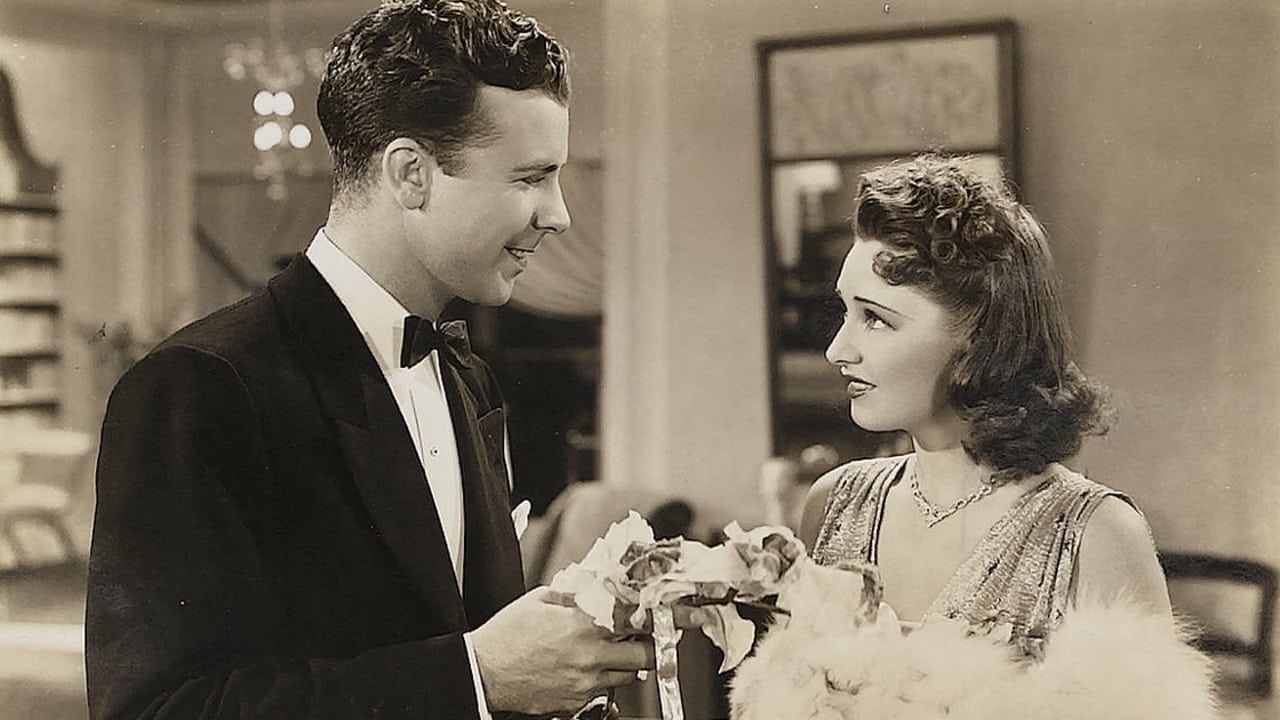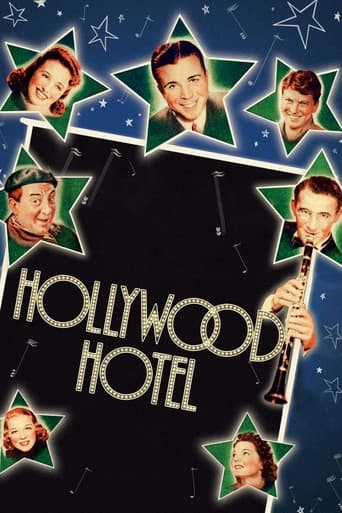Don Tyler
Hollywood Hotel was the last movie musical that Busby Berkeley directed for Warner Bros. His directing style had changed or evolved to the point that this film does not contain his signature overhead shots or huge production numbers with thousands of extras. By the last few years of the Thirties, swing-style big bands were recording the year's biggest popular hits. The Swing Era, also called the Big Band Era, has been dated variously from 1935 to 1944 or 1939 to 1949. Although it is impossible to exactly pinpoint the moment that the Swing Era began, Benny Goodman's engagement at the Palomar Ballroom in Los Angeles in the late summer of 1935 was certainly one of the early indications that swing was entering the consciousness of mainstream America's youth. When Goodman featured his swing repertoire rather than the society-style dance music that his band had been playing, the youth in the audience went wild. That was the beginning, but, since radio, live concerts and word of mouth were the primary methods available to spread the phenomena, it took some time before swing made enough inroads to produce big hits that showed up on the pop charts. In Hollywood Hotel, the appearance of Benny Goodman and His Orchestra and Raymond Paige and His Orchestra in the film indicates that the film industry was ready to capitalize on the shift in musical taste (the film was in production only a year and a half or so after Goodman's Palomar Ballroom engagement). There are a few interesting musical moments here and there in Hollywood Hotel, but except for Benny Goodman and His Orchestra's "Sing, Sing, Sing," there isn't a lot to commend. Otherwise, the most interesting musical sequences are the opening "Hooray for Hollywood" parade and "Let That Be a Lesson to You" production number at the drive-in restaurant. The film is most interesting to see and hear Benny Goodman and His Orchestra play and Dick Powell and Frances Langford sing.
lugonian
Hollywood HOTEL (Warner Brothers, 1937), directed by Busby Berkeley, capitalizes on the current trend of Hollywood stories made popular by David O. Selznick's dramatization of A STAR IS BORN. Even though films about Hollywood and the behind the scenes in movie making were nothing new by the time Hollywood HOTEL went into release, Warner Brothers spoofs Hollywood the best way it knows how, spotlighted by Dick Powell's singing, and the musical festivities by Benny Goodman and his Swing Band.The plot revolves around Ronnie Bowers (Dick Powell), a saxophone player in Benny Goodman's band, winning a talent contest and a ten-week trip to Hollywood, leaving behind band vocalist and teary-eyed girlfriend, Alice Crane (Frances Langford) at the St. Louis Airport. After arriving in Hollywood, Ronnie is escorted by Bertie Walton (Allyn Joslyn), a studio press agent for All-Star Pictures, and Joe (Eddie Acuff), a photographer, to the Hollywood Hotel. The story then shifts over to Mona Marshall (Lola Lane), a temperamental movie star sharing the room with her wacky kid sister (Mabel Todd), her even more bewildered father, Chester (Hugh Herbert), and personal secretary, Jonesy (Glenda Farrell). Because another glamor girl was offered a part she wanted, Mona leaves Hollywood. With Mona's new film, GLAMOUR GIRL, opening that evening, Walton hires waitress, Virginia Stanton (Rosemary Lane), to impersonate her, having Ronnie accompany her to the premiere. When Mona finds she's been misrepresented in public, she arranges for both Virginia and Ronnie to be fired. With Fuzzy (Ted Healy), as his new press agent, Ronnie obtains work at Callahan's (Edgar Kennedy) drive-in eatery before being discovered by director Walter Kelton (William B. Davidson) of All-Star Pictures. Much to Ronnie's surprise, rather than an acting job, he's to have his singing voice dubbed in for Alexander DuPre (Alan Mowbray), Mona's hammy co-star for an upcoming production, LOVE AND GLORY.Fine tunes in the Hollywood Hotel musical program include: "Hooray for Hollywood" (performed by Benny Goodman's Band, sung by Johnnie Davis, Frances Langford, cast); "I'm Like a Fish Out of Water" (sung by Dick Powell and Rosemary Lane); "Silhouetted in the Moonlight" (sung by Rosemary Lane at the Hollywood Bowl); "Let That Be a Lesson to You" (introduced by Johnnie Davis and played by Benny Goodman's Band, sung by Dick Powell, Rosemary Lane, Ted Healy, Mabel Todd, and drive-in patrons at Callahan's Eats, with occasional interruptions by the nervous Edgar Kennedy); Benny Goodman Band instrumental medley: "Sing, Sing, Sing" and "I've Got a Heartful of Music," "I Hitched My Wagon to a Star" (sung by Alan Mowbray, voice dubbing by Powell); "Silhouetted in the Moonlight" (sung by Jerry Cooper and Frances Langford); "Dark Eyes" (O Tchonia) A Russian folk song performed instrumentally by Raymond Paige and his Orchestra, participated by chorus humming the score; "I Hitched My Wagon to a Star" (sung by Powell); "Sing You Son-of-a-Gun" (sung by Powell and Rosemary Lane) and "Hooray for Hollywood" (sung by Johnnie Davis and cast). Of the handful of songs heard, especially during the Orchard Room sequence, its only low-point is Jerry Cooper's rendition to "Silhouetted in the Moonlight," opposite Frances Langford. A Langford solo or duet with Powell would have been sufficient. In the motion picture soundtrack to Hollywood HOTEL, compliments of Hollywood Soundstage (1981), the record not only includes the entire musical segments, but outtakes featuring the complete version to "Silhouetted in the Moonlight" which, after Rosemary Lane's solo, existing in the final print, is joined in by the singing Powell with a duet conclusion. Another cut is Benny Goodman's Band playing to "I Got a Heart Full of Music" and "House Hop," portions that were used in the musical short, FOR AULD LANG SYNE (1938), a tribute to Will Rogers.Hollywood HOTEL, under Busby Berkeley's supervision as director, is a musical of lavish scale, with none of his trademarks of surrealistic choreography for which he is famous. There's plenty of singing but no dancing, coming off like a 1940s musical, especially during the Benny Goodman's Band interludes consisting of future legends as Lionel Hampton, Harry James (on the clarinet), and Gene Krupa (drummer) performing. Ronald Reagan, another soon-to-be lead actor and future U.S. President is seen briefly as a radio announcer during the premiere of LOVE AND GLORY.Hollywood HOTEL is a far cry from being the best of the Warner Brothers musical cycle, but in many ways it's a nostalgic look to its bygone golden age, giving a glimpse of makeup artist, Perc Westmore, appearing as himself, glamorizing the ordinary waitress Rosemary Lane into movie star quality. With the exception near the conclusion of the story, Rosemary hardly shares any scenes with her older but look-alike sister, Lola. Interestingly, the one thing missing in Hollywood HOTEL which was common place in films about Hollywood on Hollywood is the use of major stars doing surprise guest bits. Imagine Dick Powell's Ronnie Bowers entering the Hollywood Hotel and coming across briefly such big named actors as Bette Davis, Pat O'Brien, Humphrey Bogart, or even the use of some inside humor in having him meeting up with Joan Blondell (Powell's off- screen wife). Instead, it uses radio announcers, Ken Niles and Duane Thompson, and newspaper columnist, Louella Parsons, appearing as themselves. Parsons, who was then a noted personality, is a far cry from being a natural performer.As a spoof, Hollywood HOTEL purposely finds the temperamental Lola Lane overacting all over the place; Hugh Herbert "woo-wooing" in and out of scenes; and in a movie within a movie, the premiere of LOVE AND GLORY, a Civil War story, is noticeably a disguised version to Margaret Mitchell's then best selling novel "Gone With the Wind," with the central character called Captain Cutler (in place of Rhett Butler). Quite lengthy at 109 minutes, it's worthy screen entertainment. Look for it next time it plays on Turner Classic Movies. (***)

